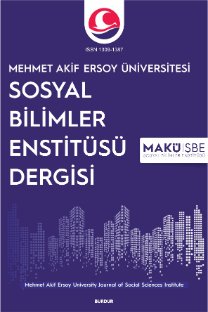"HÜKÜMLÜ” OLMANIN SOSYAL TEZAHÜRLERİ: SOSYAL DIŞLANMA, DAMGA VE SUÇ - SOCIAL APPEARENCES OF BEING AN OFFENDER: SOCIAL EXCLUSION, STIGMA AND CRIME
Şartlı Nakit Transferleri (ŞNT), Sosyal Koruma, İnsan Hakları, Yoksullukla Mücadele
SOCIAL APPEARENCES OF BEING AN OFFENDER: SOCIAL EXCLUSION, STIGMA AND CRIME
___
Bassett, Lucy (2008), “Can Conditional Cash Transfer Programs Play a Greater Role in Reducing Child Undernutrition?”, World Bank, SP Discussion Paper, No:0835.Bloom, David. E., Mahal, Ajay, Rosenberg, Larry ve Sevilla, Jaypee (2009), “Social Protection and Conditional Cash Transfers”, (Ed) Wening Handayani ve Clifford Burkley, Social Assistance and Conditional Cash Transfers-The Proceedings of the Regional Workshop, Asian Development Bank.
Castañeda, Tarsicio. (2009), “The Design and Implementation of Conditional Cash Transfer Programs: Issues and Lessons for the Future”, (Ed) Wening Handayani ve Clifford Burkley, Social Assistance and Conditional Cash Transfers-The Proceedings of the Regional Workshop, Asian Development Bank.
De Janvry, Alain, Finan, Frederico ve Sadoulet, Elisabeth (2004), “Can Conditional Cash Transfers Serve as Safety Nets to Keep Children at School and Out of the Labor Market?”, Department of Agricultural and Resource Economics, UCB, UC Berkeley.
De la Briere, Bénédicte ve Rawlings, Laura B. (2006), “Examining Conditional Cash Transfer Programmes: A Role for Increased Social Inclusion?”, ILO-Strategies and Tools against Social Exclusion and Poverty Programme.
Grosh, Margaret, Ninno, Carlo del., Tesliuc, Emil ve Ouerghi, Azedine (2008), For Protection and Promotion- The Design and Implementation of Effective Safety Nets, World Bank, Washington.
Handayani, S. Wening ve Buckley, Clifford (2009), “Workshop Highlights and Executive Summary”, (Ed), Wening Handayani ve Clifford Burkley, Social Assistance and Conditional Cash Transfers-The Proceedings of the Regional Workshop, Asian Development Bank.
Hoddinott, John ve Bassett, Lucy (2009), “Conditional Cash Transfer Programs and Nutrition in Latin America: Assessement of Impacts and Strategies for Improvement”, United Nations Food and Agriculture Organization (FAO) - Hunger-Free Latin America and the Caribbean Initiative, Şili.
International Labour Organization (2008), “Child Labour and Conditional Cash Transfer Programmes in Latin America”, International Labour Office - Geneva: ILO.
International Labour Office (ILO)-Social Security Department (2010), Extending Social Security to All: A Guide Through Challenges and Options, Geneva.
International Labour Office (ILO)-Social Security Department (2010), Extending Social Security to All: A Guide Through Challenges and Options, Geneva.
Johannsen, Julia, Tejerina, Luis ve Glassman, Amanda (2009), “Conditional Cash Transfers in Latin America: Problems and Opportunities”, (Ed) Wening Handayani ve Clifford Burkley, Social Assistance and Conditional Cash Transfers-The Proceedings of the Regional Workshop, Asian Development Bank.
Künnemann, Rolf ve Leonhard, Ralf (2008), A Human Rights View of Social Cash Transfers for Achieving the Millennium Development Goals, Brot für die Welt/Evangelischer Entwicklungsdienst(Publishers), Stuttgart/Bonn.
Ospina, Monica (2012), “The Effects of Income Shocks on Child Labor and Conditional Cash Transfer Programs as an Insurance Mechanism for Schooling”, http://www.nip-lac.org/uploads/CCT_child_labor_v.april7.pdf, (02/11/2016)
Pantelic, Ana (2008), “Poverty Alleviation in Latin America and the Caribbean: A Comparative Analysis of Microfinance and Conditional Cash Transfer”, Boston University, Master’s Research Paper.
Samson, Michael, Niekerk, Ingrid van ve Quene, Kenneth M. (2006), Designing And Implementing Social Transfer Programmes, Economic Policy Research Institute (EPRI) Press, Cape Town.
Skoufias, Emmanuel (2009), “Conditional Cash Transfers Reducing Present and Future Poverty”, (Ed), Wening Handayani ve Clifford Burkley, Social Assistance and Conditional Cash Transfers-The Proceedings of the Regional Workshop, Asian Development Bank.
Soares, F. Veras. (2009), “Conditional Cash Transfers: A Vaccine Against Poverty and Inequality?”, International Policy Centre for Inclusive Growth (IPC - IG), Brezilya
Son, H. Hwa (2008), “Conditional Cash Transfer Programs: An Effective Tool for Poverty Alleviation?”, Asian Development Bank, ERD Policy Brief No.51.
Tzannatos, Zafiris, Orazem, Peter F. ve Sedlacek, Guilherme (2009), “Policy Options to Eradicate Child Labor and Promote Education in Latin America”, (Ed) Peter F. Orazem, Guilherme Sedlacek ve Zafiris Tzannatos, Child Labor and Education in Latin America-An Economic Perspective, Palgrave Macmillan.
Vermehren, Andrea (2003), “Conditional Cash Transfer Programs: An Effective Tool for Reaching the Poorest and Most Vulnerable”, (Ed) Ana-Maria Arriagada ve Robert Holzman, Volatility, Risk, and Innovation: Social Protection in Latin America and Caribbean, The World Bank.
- Yayın Aralığı: 4
- Başlangıç: 2009
- Yayıncı: Burdur Mehmet Akif Ersoy Üniversitesi Sosyal Bilimler Enstitüsü
YOKSULLUKLA MÜCADELEDE ŞARTLI NAKİT TRANSFERLERİ; İNSAN HAKLARI AÇISINDAN BİR DEĞERLENDİRME
Meral TİMURTURKAN, Gönül DEMEZ, Elife KART, Cihan ERTAN, Selim CANKURTARAN, Salih AKTİN
ORTAÇAĞ TÜRK DÜNYASINDA HALI - CARPET IN THE MEDIEVAL TURKISH WORLD
Meral TİMURTURKAN, Gönül DEMEZ, Elife KART, Cihan ERTAN, Selim CANKURTARAN, Salih AKTİN
Ömer TEKŞEN, Sevinç Şahin DAĞLI
